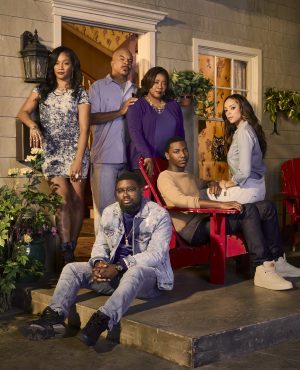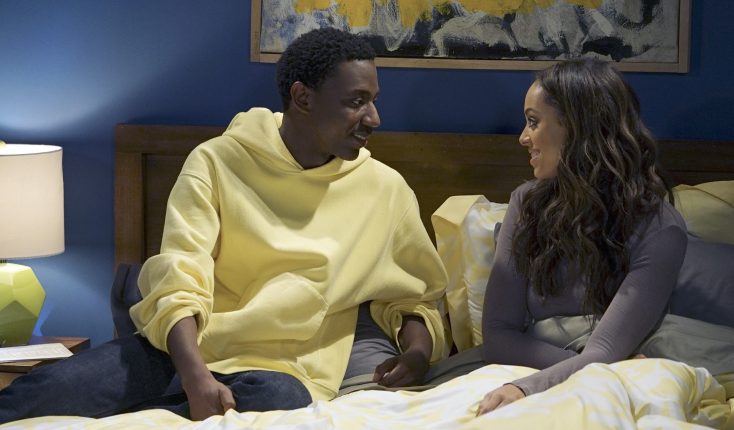
(l-r) Tiffany Haddish as Nekeisha, David Alan Grier as Joe Carmichael, Lil Rel Howery as Bobby Carmichael, Loretta Devine as Cynthia Carmichael, Jerrod Carmichael as Jerrod Carmichael, Amber Stevens West as Maxine in THE CHARMICHAEL SHOW. ©NBCUniversal Media. CR: Matthias Clamer/NBC.
By ANGELA DAWSON
Front Row Features
Some comedians seem to radiate positive energy whenever they enter the room. Robin Williams was one of them. Kevin Hart does. Jerrod Carmichael, a popular standup comic and star of the NBC sitcom “The Carmichael Show,” is another.
The 30-year-old, whose influences include Richard Pryor, George Carlin and Bill Cosby, is known for his edgy topical humor on stage. He’s had two HBO comedy specials, including “Jerrod Carmichael: 8,” which aired in March. His unique perspective of the world has been infused into the series, which has addressed subjects that don’t necessarily seem to lend themselves to comedy—gun rights, Black Lives Matter, gay rights and more, and yet the fictional multigenerational Carmichael family, in which he serves as executive producer, writer as well as star, has done just that over the past two seasons. The third season promises to continue its mission to combine ongoing ideological debates with just the right amount of comedy.
One of the episodes this coming season is titled “Yes Means Yes,” and opens the debate amongst the fictional show’s outspoken family members to the subject of consent. Was a drunken sexual encounter involving a family member and a young lady consensual, or was it technically (or overtly) a rape?
Returning to the series are cast regulars David Alan Grier, Loretta Devine, Lil Rel Howery, Amber Stevens West and Tiffany Haddish. Another upcoming episode delves into the touchy subject of assisted suicide, where laughs are mixed in with serious debate.
Carmichael himself is excited about an episode in which he utters the N-word several times. The argument centers on whether use of the reviled word makes it more powerful or dilutes its power. The airing of the episode marks the first time network censors have permitted use of the word during prime time.
During a recent NBC press day, the North Carolina native spoke about the critically acclaimed series returning for its third season. (The third season premieres Wednesday May 31, at 9 p.m./8C.)
Q: Since this is your show, with your name on it and it’s basically your brand, how much creative input do you give to the writers and showrunner?
Carmichael: It’s an open forum. The things I’m genuinely inspired by, we do that. But, for the most part, it’s open. It’s all about the conversation, the discussion, the argument. If something in the writers’ room causes us to get angry or feel something, then I get really excited about it. (Executive producer) Danielle Sanchez-Witzel is my everything. She’s brilliant and so we’re so incredibly lucky to have her. I’ll come in and get really excited about a topic or even a scene, and she makes it into a television episode. It’s great to work with her, especially.
Q: What episode are you particularly looking forward to airing this season?
Carmichael: This season? All of it, and I’m not just saying that. So far, every episode I’ve been in, I’m really excited about. We shot one about addiction a couple of weeks ago. We did one where there’s a challenge to Joe and Cynthia’s relationship last week. We’ve done about assisted suicide. We did one where I got to say ******* (the N-word) for the first time on network television, which is a thrill. I can’t tell you how thrilling that is, so all of them have been very exciting. We’re eight episodes in of 13, and I’m really excited about all of them. We’re in a great space right now.
Q: When you’re doing standup, do you think they might turn your material into a TV episode? Do you think about that when you’re writing your material?
Carmichael: The perspective stays the same. Perspective is king for standup comedy as it is for a television show. It’s really the same thing for all recorded art. It’s all about perspective. What unique can you bring to the table. By trying to hone that in standup, it naturally kind of falls into the show and anything else that I’m doing. So, when I’m honing a (standup) routine, it’s really about me trying to figure out how I feel about something. That mirrors what we do when we’re creating an episode.
Q: Has the show affected your standup act?
Carmichael: My standup probably affects the show more. Sometimes I’ll write a joke and put it into the show and we’ll tape it, so I’ll stop myself from saying it on stage. So that’s the way it may have affected my standup the most.
Q: Does it feel better or different now that you guys have been together for three seasons?
Carmichael: I love (the cast and crew) like my own family. It really does feel like home to the point where sometimes I have my real clothes in my (TV character’s) closet. Shoes too. Sometimes I’ll be at home looking for a pair of sneakers and realize that I’ve left them on set. That’s how close it is.
Q: When you were a little boy, did you get into trouble because you were funny?
Carmichael: Even better, I got out of trouble because I was funny. That’s the testament: just finding a way to use humor to avoid homework and projects. It contributed to everything I did, probably starting around the fifth or sixth grade. Definitely by eighth grade, humor was such a major part of my life. I used it in arguments. It’s always been at the core of my being.
Q: Where did you get your sense of humor from? Is your family funny?
Carmichael: Yeah, they’re all actually really funny in their own right. Whether they’re aware of it or not, they’re really really funny. That’s kind of the difference between professional comedian and a funny sister or brother is the awareness of it. Sometimes they don’t know they’re being funny but they’re all hilarious
Q: I can’t imagine there’s anything more challenging than standing up in front of an audience and daring them to laugh. Why do comedians do it?
Carmichael: Because they’re crazy. They have unresolved issues with their father. (He laughs.) We have a need to be heard and a need to share thoughts and feelings. It’s like when you hear a song and want to tell all of your friends about it, that’s how I feel about thoughts. It’s that same intention. It’s like when you watch a movie and you feel like everyone needs to see it. That’s how I feel about a thought in the shower. And sometimes I’m right. (He laughs.)





